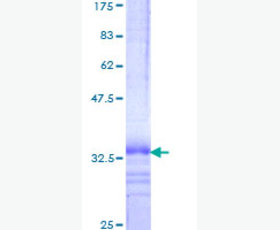Recombinant Human Galectin-7/LGALS7
| Product name: | Recombinant Human Galectin-7/LGALS7 |
| Source: | E. coli |
| Purity: | Greater than 95% as determined by reducing SDS-PAGE. |
| Buffer Formulation: | Lyophilized from a 0.2 μm filtered solution of 20mM PB, 150mM NaCl, pH 7.4. |
| Applications: | Applications:SDS-PAGE; WB; ELISA; IP. |
| Storage: | Avoid repeated freeze/thaw cycles. Store at 2-8 oC for one month. Aliquot and store at -80 oC for 12 months. |
| UOM: | 100ug/50ug/200ug/1mg/1g |
| Source | E. coli |
| Description | Recombinant Human Galectin-7 is produced by our E.coli expression system and the target gene encoding Met1-Phe136 is expressed. |
| Names | Galectin-7, Gal-7, HKL-14, PI7, p53-Induced Gene 1 Protein, LGALS7, PIG1, LGALS7B |
| Accession # | P47929 |
| Formulation | Lyophilized from a 0.2 μm filtered solution of 20mM PB, 150mM NaCl, pH 7.4. |
| Shipping |
The product is shipped at ambient temperature. |
| Reconstitution |
Always centrifuge tubes before opening. Do not mix by vortex or pipetting. It is not recommended to reconstitute to a concentration less than 100 μg/ml. Dissolve the lyophilized protein in ddH2O. Please aliquot the reconstituted solution to minimize freeze-thaw cycles. |
| Storage |
Lyophilized protein should be stored at < -20°C, though stable at room temperature for 3 weeks. Reconstituted protein solution can be stored at 4-7°C for 2-7 days. Aliquots of reconstituted samples are stable at < -20°C for 3 months. |
| Biological Activity |
Activation measured by its ability to agglutinate human red blood cells. |
| Purity |
Greater than 95% as determined by reducing SDS-PAGE. |
| Endotoxin | Less than 0.1 ng/µg (1 IEU/µg) as determined by LAL test. |
| Amino Acid Sequence |
MSNVPHKSSLPEGIRPGTVLRIRGLVPPNASRFHVNLLCGEEQGSDAALHFNPRLDTSEVVFNSK EQGSWGREERGPGVPFQRGQPFEVLIIASDDGFKAVVGDAQYHHFRHRLPLARVRLVEVGGDVQL DSVRIF
|
| Background | The Galectin family of proteins, with specificity for Nacetyllactosamine containing glycoproteins, consists of beta-galactoside binding lectins containing homologous carbohydrate recognition domains (CRDs).They also possess hemagglutination activity, which is attributable to their bivalent carbohydrate binding properties. Galectins are active both intracellularly and extracellularly. Although they are localized primarily in the cytoplasm and lack a classical signal peptide; they can be secreted by one or more as yet unidentified non-classical secretory pathways. They have diverse effects on many cellular functions including adhesion, migration, polarity, chemotaxis, proliferation, apoptosis, and differentiation. Galectins may play a key role in many pathological states, including autoimmune diseases, allergic reactions, inflammation, tumor cell metastasis, atherosclerosis, and diabetic complications. |














